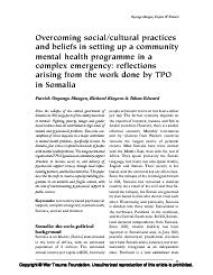Overcoming social/cultural practices and beliefs in setting up a community mental health programme in a complex emergency: reflections arising from the work done by TPO in Somalia
Since the collapse of the central government of Somalia in 1991, large parts of the country have been in turmoil. Fighting, poverty, hunger and gender based violence have all contributed to high levels of mental and psychosocial problems. Excessive consumption of khat may also be a major contributor to mental health problems, specifically in men. In Somalia, few services respond to the needs of people with mental health problems. The nongovernmental organisation TPO Uganda used community support structures to increase access to, and delivery of, psychosocial support services, through local imple-mentingpartners, and the line ministries. This paper describes the steps to create a capacity buildingpro-gramme in an unstable and fragile context, with the aim of mainstreaming psychosocial support in public services
Geachte bezoeker,
De informatie die u nu opvraagt, kan door psychotraumanet niet aan u worden getoond. Dit kan verschillende redenen hebben,
waarvan (bescherming van het) auteursrecht de meeste voorkomende is. Wanneer het mogelijk is om u door te verwijzen naar de bron
van deze informatie, dan ziet u hier onder een link naar die plek.
Als er geen link staat, kunt u contact opnemen met de bibliotheek,
die u verder op weg kan helpen.
Met vriendelijke groet,
Het psychotraumanet-team.
Reference:
Patrick Onyango Mangen, Richard Kinyera, Taban Edward | 2011
In: Intervention: the international journal of mental health, psychosocial work and counselling in areas of armed conflict, ISSN 1571-8883 | 9 | 1 | 53-60
http://www.interventionjournal.com/sites/default/files/Onyango%2C%20Paratharayil%2C%20vdBerg%20et%20al.pdf
In: Intervention: the international journal of mental health, psychosocial work and counselling in areas of armed conflict, ISSN 1571-8883 | 9 | 1 | 53-60
http://www.interventionjournal.com/sites/default/files/Onyango%2C%20Paratharayil%2C%20vdBerg%20et%20al.pdf


